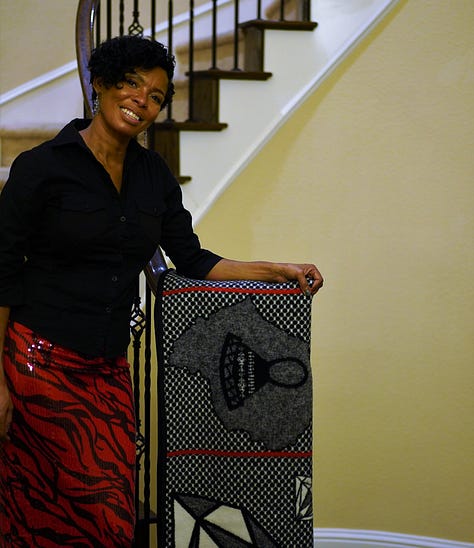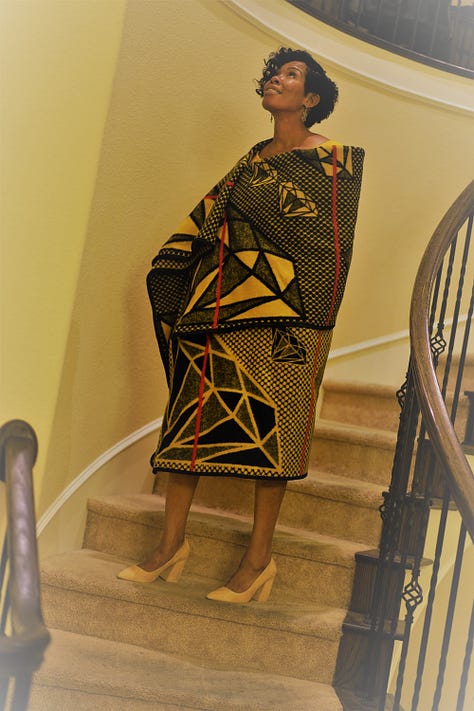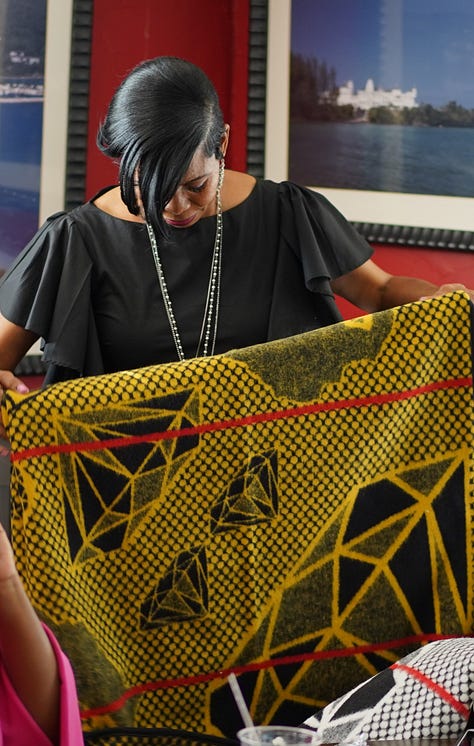We sat down for a chat with ‘m’e Alice Bereng (TX, USA) to hear the story behind one of her many ventures, Diaspora Diamond Blankets. ‘M’e Alice is a multifaceted, multi-hyphenated entrepreneur and stylist (in hair and fashion) who grew up in Maseru, Motimposo and now spends most of her time with family in Morija, Roma and Thaba–Bosiu. It’s easy to see ‘m’e Alice’s heart for Basotho (at home and in the diaspora) in all she does, especially her passion to see these beloved blankets create work and economic opportunity in Lesotho. Her line of blankets, pictured below, is a fresh take on the classic Seanamarena, produced in collaboration with Aranda using the same 50/50 merino wool/acrylic combination and meticulous care.



Here’s a bit more of our conversation.
What’s your vision for Diaspora Diamond Blankets?
This idea was born out of a gathering with some members of the diaspora in New York in 2018. A bunch of us met and were discussing what businesses/initiatives we could start – as we often do when we come together. I floated the idea of working with fabric/prints and actually decided to do it when I left that meeting. At the time, I didn’t know what I was doing and thought of starting a business selling clothes with our blankets’ design. At the time, most people were cutting blankets to make clothes out of them because they wanted the print, but that didn’t sit well with me because the blanket is too heavy and too warm to be practical for some kinds of clothes. I thought it would be better to have fabrics with these designs and created about 25 different patterns.
What inspired the design of these blankets?
Once the fabric business was up and running, I spoke with Aranda to see if we could have a blanket whose story is about the Lesotho diaspora. The blanket is really for those of us living away from home to realize that we’re never forgotten. I also realized that our blankets have so many depictions on them – maize, crowns, and so on – but none of them have any diamonds, something that people know Lesotho for.
Basotho will always wear blankets because we need them when it is cold. Culture aside, we need them because of the climate alone. But when you look at it, we don’t benefit [from having them as a staple in our wardrobe] because we’re mainly consumers of these blankets as products. But if Aranda can partner with the Lesotho government and build another manufacturing facility in Lesotho where Basotho can have jobs, that would make a huge difference. That’s the goal and it has to come to pass!
How is the business doing now? What are the challenges you’ve faced on this journey?
One challenge is that Aranda is not able to make the blankets continuously because it takes time to source some of the raw materials, especially mohair. It’s also difficult because the production is entirely with Aranda for now, so the blankets are not always in stock. Luckily, every time they’re available in Lesotho, they sell out as soon as they hit the shelves! The blankets are sold out so quickly that it has been hard to bring them to the US, which shows just how well Basotho, including the royal family, have supported this new line.
In the long run, I also want to have a place where we can have a Basotho Blankets Presentation during Black History Month in the US.
How can the diaspora support you in what’s next?
I was recently awarded a patent for my design of a hair towel tailored to the hair care business. It’s a unique design that prevents water dripping down the client’s back during salon visits, unlike a regular bath/hand towel. It is snug around the neck and includes snaps to keep it in place. I’d like to set up a manufacturing facility in Lesotho to produce these and create jobs for Basotho. I hope to sell it through TikTok and need at least 1,000 subscribers on my channel to become eligible for a business account. Please consider subscribing to the channel, @alicebereng, and sharing it with your communities!
What advice do you have for people in the diaspora who want to start businesses or organizations?
I’ve realized that everybody can think of what to do. Most people’s problem is that they want to see the beginning and the end before they start. It’s very rare to see the whole thing; you can hope for the end, what it should be, but you can never be sure. But the most important thing is to start. People sometimes don’t see how to start.
Once you start, little by little, the rest of the journey will open itself up. Just start a little bit and it will work itself out!
I also think that we (in the diaspora) need to help each other. We need to learn from other diaspora communities in the US, like Asian communities, where people sell to each other and support each other's businesses. We don’t even know what other people are doing so we don’t even see how we can help each other. What are you doing in your corner of the world? Do you need me to support you?
Where can people reach out to you and follow your work?
You can read more of my story in my book, Stylist and Client: Dos and Don’ts Manual. I am also available @alicebereng on TikTok and at hisheritage1@gmail.com.



